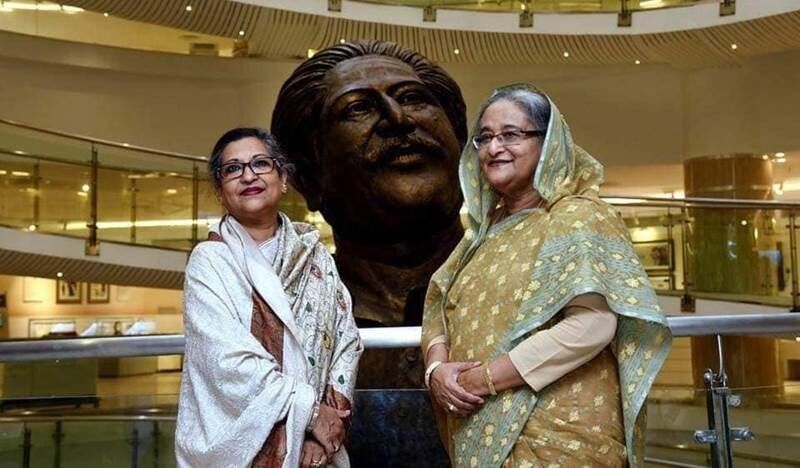Sheikh Rehana's 1979 global appeal that brought Bangabandhu's murderers to book

Opposing the introduction of a shameful act to shield the assassins of 'Bangabandhu' Sheikh Mujibur Rahman, his youngest daughter Sheikh Rehana issued a global appeal to bring the killers to justice in 1979, four years after almost her entire family was wiped out in the 1975 coup.
This was the first major call for justice against the assassins of Bangabandhu and four national leaders.
Ironically, four years into country's independence, the founding father was assassinated with almost all of his family members by a group of pro-Pakistan army officers in a coup at the dead of the night on august 15, 1975.
Sheikh Rehana and Sheikh Hasina, two daughters of 'Bangabandhu', survived the assassination as they were in Germany on that fateful night.
And soon after the killing, the military rulers engineered the Indemnity Ordinance in the national Parliament to allow the coup masterminds complete immunity from prosecution.
The ordinance was the brainchild of the country's first military dictator Ziaur Rahman, founder of BNP, who left no stone unturned to erase the secular values of the country's glorious liberation struggle.
"Sir president is killed. So what Vice President is here", is how the ambitious Ziaur (then deputy army chief) responded right after news of 'Bangabandhu' s assassination was brought to his notice, according to a BBC Bangla report.
Ziaur was made army chief soon after the bloody coup. And just within three months Zia made himself president of the country. Then he began the process to rehabilitate the pro-Pakistan war criminals and unleashed a process of what many describe as re-Pakistanisation, undoing the supreme sacrifices of three million people to earn freedom.
Later successive governments also continued with the notorious legacy till 1996, a policy envisaged and implemented by Ziaur.
Amidst the passage of the Indemnity Ordinance to shield the 'Bangabandhu' killers, a message from his eldest daughter Sheikh Hasina was read out by Sheikh Rehana at an all-European Bakshal conference in Sweden in 1979.
The speech, delivered on May 10 that year in presence of European country heads, the UN chief, and international NGO top honchos in Stockholm, can be seen as the first major effort to mobilise global pressure on the military-run Bangladesh government at that time to punish the killers.
Later, in June the same year, Sheikh Rehana planned to meet acclaimed legal practitioner Sir Thomas Williams, QC, who had defended Bangabandhu in the Agartala Conspiracy Case.
Bouncing the idea off Sheikh Hasina, she, along Shafique, met Sir Williams at the House of Commons. She requested him to take over as the president of all-Europe Bangabandhu Parishad. Sir Williams promptly obliged.
On August 16, 1980, observing the fifth year of Bangabandhu's assassination, a huge gathering, the largest till then following the independence of Bangladesh, was organised, with Sheikh Hasina gracing the event as the chief guest.
Sir Thomas Williams, QC was the main speaker. Dr Conrad Wood of the British Conservative Party and two lawmakers from the British Labour Party spoke at the programme, where Sir Thomas Williams promised to bring the assassins to the book, Awami League sources said.
On September 19, 1980, the veteran legal expert formally announced, at a restaurant near the House of Commons in London, the formation of a probe committee on Bangabandhu's assassination, with him at the head and Nobel laureate Irish lawyer Seán MacBride as one of the members.
As Jeffrey Thomas MP and Solicitor Abre Rose applied to Bangladeshi High Commission for visas in the January of 1981, their application was turned down, and the visa rejection issue made its way to the House of Lords in February. Clearly the country's military rulers were not keen to investigate and punish the Bangabandhu killers.
The then-British Prime Minister Lord Carrington and many others took part in the discussion organised by Sir Thomas Williams.
The international probe committee submitted a preliminary report on the murder of Bangabandhu and his family and four national leaders, on March 20, 1982.
However, the killers were provided with diplomatic ranks by Zia's administration and also allowed to join politics until Sheikh Hasina had been voted back to power in 1996.
And justice for both sisters were finally delivered following legal proceedings initiated after Hasina returned to power.



